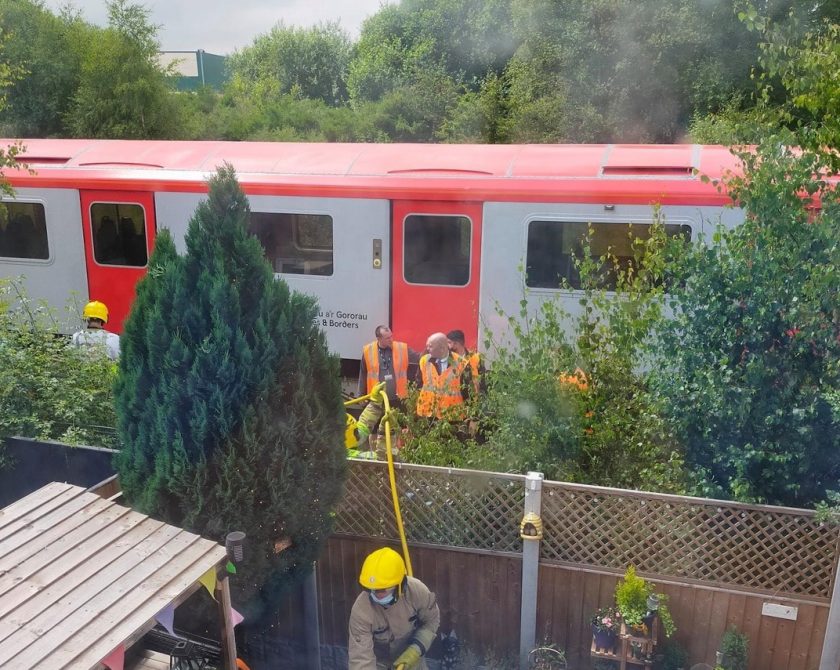Transport official lifts lid on delays to introduction of new Class 230 trains on Wrexham – Bidston rail line

A Transport for Wales (TfW) Executive has lifted the lid on the so-called “thermal” incidents that have further delayed the introduction of the new Class 230 hybrid trains on the Wrexham to Bidston line.
TfW revealed a new twist in its £800m rolling stock upgrade plans last week with news that its Class 197 “made in Wales” diesel trains will enter service on the Borderlands Line “by the end of this calendar year.”
The details were tucked away at the bottom of a TfW press release ahead of Friday’s unveiling of the Class 197 train to the media at Chester Railway Station.
It’s perhaps no great surprise the Class 197 units will be used on the Borderlands Line, with nearly 80 of them being built for TfW, many will be stabled and maintained at the train operators’ facilities in Chester.
Having a nose around the new Class 197 train at Chester Station TfW say the units will operate on the Wrexham to Bidston line – hoping to find out some timescales this morning pic.twitter.com/6DreQLBmGa
— DEESIDE.com (@DeesideDotCom) July 1, 2022
It will also be the fasted way the Welsh Government backed rail operator can introduce new trains on the Borderlands Line given the ongoing issues surrounding their other new train, the Class 230.
The Wrexham to Bidston line is an integral part of the Welsh Government’s £50m North Wales Metro project which promises an increase in the number of services on the route to two per hour, but only if new trains are brought in.
By comparison, the South Wales Metro project will have over £730m pumped into it, leading to Senedd Member, Sam Rowlands saying “people in North Wales often feel frustration there is not enough investment in this part of the world.”
Upcycled
Class 230 units are a fleet of five recycled tube trains TfW purchased for the Borderlands Line to fulfil a short-term commitment of increasing the number of services on the line.
However their introduction has been delayed by more than three years due to technical issues.
The hybrid diesel/battery train, manufactured by UK based Vivarail, uses the bogies and aluminium bodyshells of withdrawn London Underground trains.
The trains were intended to come into service in 2019 but TfW only took delivery of units from Vivarail in July 2020.
Staff training requirements were hampered by the Pandemic leading to further delays.
Other delays have been caused by what TfW called “technical issues” in July last year.

Firefighters were called out to a ‘small fire’ on one of Transport for Wales’ new Class 230 trains in July last year
It was understood at the time that training was temporarily suspended after a small fire on one of the units.
TfW had hoped to bring the Class 230 units into operation on the Wrexham to Bidston in May which would have seen a new early morning service on the route.
But a further battery-related “thermal incident” in April led to the implementation programme being suspended.
Those observing developments have suggested the TfW Class 230 programme could be in danger of being cancelled and news that Class 197 will be used between Wrexham – Shotton – Bidston has heightened speculation.
However, TfW is confident engineers have found a fix for the Class 230 “thermal incidents” and they will also be brought into service “this calendar year.”
Speaking to Deeside.com on Friday, Alexia Course, Director of Transport Operations at TfW explained more about the issues surrounding the Class 230 introduction.
TfW has had to do a “very detailed safety and engineering investigation” into what caused the so-called thermal incidents and “we have got to the bottom of it.” Alexia said.
She said: “We’ve found the solution, it is going through our engineering compliance process to get signed off.”
Alexia said the issue was to do with the “threshold cut-off point with the batteries because it’s a different type of traction for that line.”
“There was an issue to do with the threshold of the power outage, we have got to the bottom of that, it was basically to do with a bit of kit.” She said while explaining she couldn’t be more detailed, as “I’m not an engineer.”
She said the part, “had a more sensitive threshold level which then resulted in this (thermal) event happening.”
“We have got to replace that bit of kit and that is what is taking a bit of extra time because we have got to order it as a specialist part, get it delivered, get it installed and get it all tested.”
Alexia said the fix will “increase the threshold levels, which means that the batteries can operate before going into a kind of thermal event mode.”
“It took a while to figure out where the problem was.”
“We’re just waiting for the engineering safety certification to go through to say the trains are now good to go.”
Alexia said: “Once that’s all gone through and it’s all been safety validated again, we will then be able to recommence our driver training programs.”
Training
“We trained all our drivers ready for May but then obviously the thermal event incident happened.”
The Class 230 drivers are now out of competency due to the length of time the programme has been suspended.
“It’s been too long since they did their driver training, so they have got to completely redo their driver training.” She said.
“It means that is also going to delay when we can bring the trains into passenger service.”
In terms of bringing the Class 230s into service on the Wrexham Bidston line, Alexia said: “We are still aiming for the end of autumn-winter time, so still within this calendar year.”
Spotted something? Got a story? Email: [email protected]
Latest News
